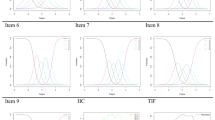Abstract
Chronic fatigue syndrome (CFS) is characterized by debilitating fatigue and a variety of somatic symptoms. Few studies have examined psychological aspects of CFS. In the present study, self-efficacy is shown to be a significant predictor of CFS symptoms beyond the variance accounted for by demographic variables and distress. Further psychological CFS research is encouraged by (1)identifying dimensions that are salient in the experience and study of CFS, (2) providing preliminary psychometric data for measures of those dimensions, and (3)identifying psychological variables that serve as moderators of the experience of CFS.
Similar content being viewed by others
References
Bandura, A. (1977). Self-efficacy: Toward a unifying theory of behavioral change. Psychol. Rev. 84: 191-215.
Bandura, A., Reese, L., and Adams, N. E. (1982). Microanalysis of action and fear arousal as a function of differential levels of perceived efficacy. J Pers. Soc. Psychol. 43: 5-21.
Beck, A. T., and Beck, R. W. (1972). Screening depressed patients in family practice: A rapid technic. Postgrad. Med. 52: 81-85.
Blakely, A. A., Howard, R. C., Sosich, R. M., Campbell, J., Menkes, D. B., and Spears, G. F. (1991). Psychiatric symptoms, personality and ways of coping in chronic fatigue syndrome. Psychol. Med. 21: 347-362.
Cho, W. K., and Stollerman, G. H. (1992). Chronic fatigue syndrome. Hosp. Pract. Sept.: 119-135.
DeLuca, J., Johnson, S. K., and Natelson, B. H. (1993). Information processing efficiency in chronic fatigue syndrome and multiple sclerosis. Arch. Neurol. 50: 301-304.
Gurwitt, A., Barrett, S., Brown, S., Butaney, E. C. A., Gorman, B., and Kilgore, J. L. (1992). Chronic Fatigue Syndrome: A Primer for Physicians and Allied Health Professionals, Massachusetts CFIDS Association, Waltham.
Kerns, R. D. (1996). Psychosocial factors: Primary or secondary outcomes? In Cohen, M. J. M., and Campbell, J. N. (eds.), Pain Treatment Centers at a Crossroads: APractical and Conceptual Reappraisal, Vol. 7. Progress in Pain Research and Management, IASP Press, Seattle, WA.
Kerns, R. D., Turk, D. C., and Rudy, T. E. (1985). The West Haven-Yale Multidimensional Pain Inventory (WHYMPI). Pain 23: 345-356.
Krupp, L. B., Sliwinski, M., Masur, D. M., Friedberg, F., and Coyle, P. K. (1994). Cognitive functioning and depression in patients with chronic fatigue syndrome and multiple sclerosis. Arch. Neurol. 51: 705-710.
Lorig, K., and Gonzalez, V. (1992). The integration of theory with practice: A 12-year case study. Health Educ. Q. 19: 355-368.
Lorig, K., Chastain, R. L., Ung, E., Shoor, S., and Holman, H. R. (1989). Development and evaluation of a scale to measure perceived self-efficacy in people with arthritis. Arth. Rheum. 32: 37-44.
O'Leary, A., Shoor, S., Lorig, K., and Holman, H. R. (1988). A cognitive-behavioral treatment for rheumatoid arthritis. Health Psychol. 7: 527-544.
Reyes, M., Gary, H. E., Dobbins, J. G., Randall, B. Steele, L., Fukuda, K., Holmes, G. P., Connell, D. G., Mawle, A. C., Schmid, D. S., Stewart, J. A., Schonberger, L. B., Gunn, W. J., and Reeves, W. C. (1997). Surveillance for chronic fatigue syndrome—FourU.S. cities, September 1989 through August 1993. MMWR 46(No. SS-2): 8.
Riccio, M., Thompson, C., Wilson, B., Morgan D. J. R., and Lant, A. F. (1992). Neuropsychological and psychiatric abnormalities in myalgic encephalomyelitis: A preliminary report. Br. J. Clin. Psychol. 31: 111-120.
Schmaling, K. B., DiClementi, J. D., Cullum, C. M., and Jones, J. F. (1994). Cognitive functioning in chronic fatigue syndrome and depression: A preliminary comparison. Psychosom. Med. 56: 383-388.
Smith, A. P., Behan, P. O., Bell, W., Millar, K., and Bakheit, M. (1993). Behavioral problems associated with the chronic fatigue syndrome. Br. J. Psychol. 84: 411-423.
Surawy, C., Hackmann, A., Hawton, K. H., and Sharpe, M., (1995). Chronic fatigue syndrome: A cognitive approach. Behav. Res. Ther. 33: 535-544.
Rights and permissions
About this article
Cite this article
Findley, J.C., Kerns, R., Weinberg, L.D. et al. Self-Efficacy as a Psychological Moderator of Chronic Fatigue Syndrome. J Behav Med 21, 351–362 (1998). https://doi.org/10.1023/A:1018726713470
Issue Date:
DOI: https://doi.org/10.1023/A:1018726713470




